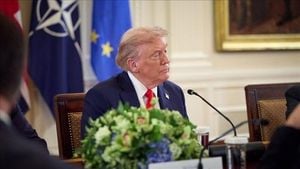The Taiwan Semiconductor Manufacturing Company (TSMC) has become embroiled in controversy after halting chip supplies to two companies suspected of connections to Huawei, igniting discussions about the effectiveness of U.S. export controls aimed at preventing advanced technology from reaching the Chinese telecommunications giant.
Reports surfaced recently indicating TSMC’s abrupt termination of shipments to Chinese firms, Sophgo and Bitmain, which have been accused of potentially collaborating with Huawei. This decision stems from concerns about these companies facilitating technology transfers to Huawei, violating U.S. sanctions put in place to restrict the company’s access to sophisticated chips. The halting of these supplies was first reported by multiple news outlets, raising alarm bells about the loopholes within the existing export control frameworks.
Sophgo, known for its development of chips based on the open RISC-V instruction set architecture, has vehemently asserted its independence from Huawei, stating, "Sophgo has never engaged in any direct or indirect business relationship with Huawei." Despite these claims, the shadows of suspicion loomed larger when it was revealed through investigations conducted by the U.S. Commerce Department.
The case not only spotlighted TSMC's operations but also highlighted broader worries over the capabilities of Huawei, particularly concerning artificial intelligence systems. A spokesperson from the U.S. government did not immediately confirm whether any investigation was underway, compounding the uncertainty surrounding the entire matter.
Bitmain, another Chinese venture linked to cryptocurrency hardware, also defended itself against allegations of wrongdoing, labeling them as "false and baseless." Nonetheless, Bitmain's history of similar controversies has earned it scrutiny; prosecutors had once raided its offices to investigate claims of illegal hiring.
This latest incident raises questions about the operational transparency of chip supply chains, especially considering TSMC’s role as the world’s largest dedicated independent semiconductor foundry. John Moolenaar, the Republican chairman of the U.S. House Committee on China, termed the findings a "catastrophic failure of U.S. export control policy," calling for immediate accountability from both TSMC and the Commerce Department.
The crisis is especially significant as it follows several years of U.S. efforts to tighten technology transfer regulations to China, aimed primarily at safeguarding national security against potential risks posed by Huawei and similar entities. The U.S. government has long barred Chinese companies from obtaining advanced technologies, hoping to curb military advancements facilitated by such access.
U.S.-China relations have become increasingly fraught over issues like Taiwan and high-tech exports, underscoring the geopolitical stakes involved. The extent to which Huawei may have gained access to TSMC-manufactured chips echoes frustrations shared among U.S. policymakers, who worry about China's advancing capabilities amid sanctions and restrictions.
The emergence of “shadow networks” — clandestine channels through which advanced chips reportedly reach blacklisted firms like Huawei — has prompted analysts to advocate for stricter regulatory scrutiny over semiconductor exports. Experts like Min-yen Chiang argue for enhanced due diligence concerning chip manufacturer clients to preempt violations reminiscent of this troubling scenario.
TSMC’s immediate response involved notifying both the U.S. and Taiwanese governments about the potential rule violations. Meanwhile, the Taiwanese Minister of Economic Affairs stated the country remains committed to adhering to U.S. export controls.
Investigations are expected to take time, and the long-term impact on TSMC's standing among its clients and its operational protocols remains to be seen. The bipartisan outrage within U.S. legislative circles indicates potential repercussions for not only TSMC but other firms reliant on U.S. technologies should similar violations surface.
With the stakes heightened for tech giants like Apple and Nvidia, who heavily rely on TSMC for chip production, future operations may see additional layers of complexity imposed by both U.S. and Taiwanese regulatory frameworks. Ongoing scrutiny may also influence the broader semiconductor supply chain amid growing fears over market transparency.
The magnitude of the situation calls for thorough investigations, as TSMC reassured stakeholders of its dedication to lawfully adhering to export controls. “TSMC is law-abiding and is committed to complying with all applicable regulations,” the company asserted.
The ramifications of TSMC's actions have raised alarms on multiple fronts, with tech industries grappling with the ramifications of potential sanctions violations and their broader trade relations with China. Companies worldwide are now considering the fallout from U.S. sanctions as they navigate the increasingly contested terrain of semiconductor manufacturing and supply chains.
For industry players at stake, the ability to pivot swiftly to new suppliers or reconfigure production to accommodate regulatory changes could mean the difference between staying competitive and falling behind. The ripple effects of TSMC halting supplies may extend far beyond immediate allegations, reshaping future partnerships and strategies within the global tech arena.



